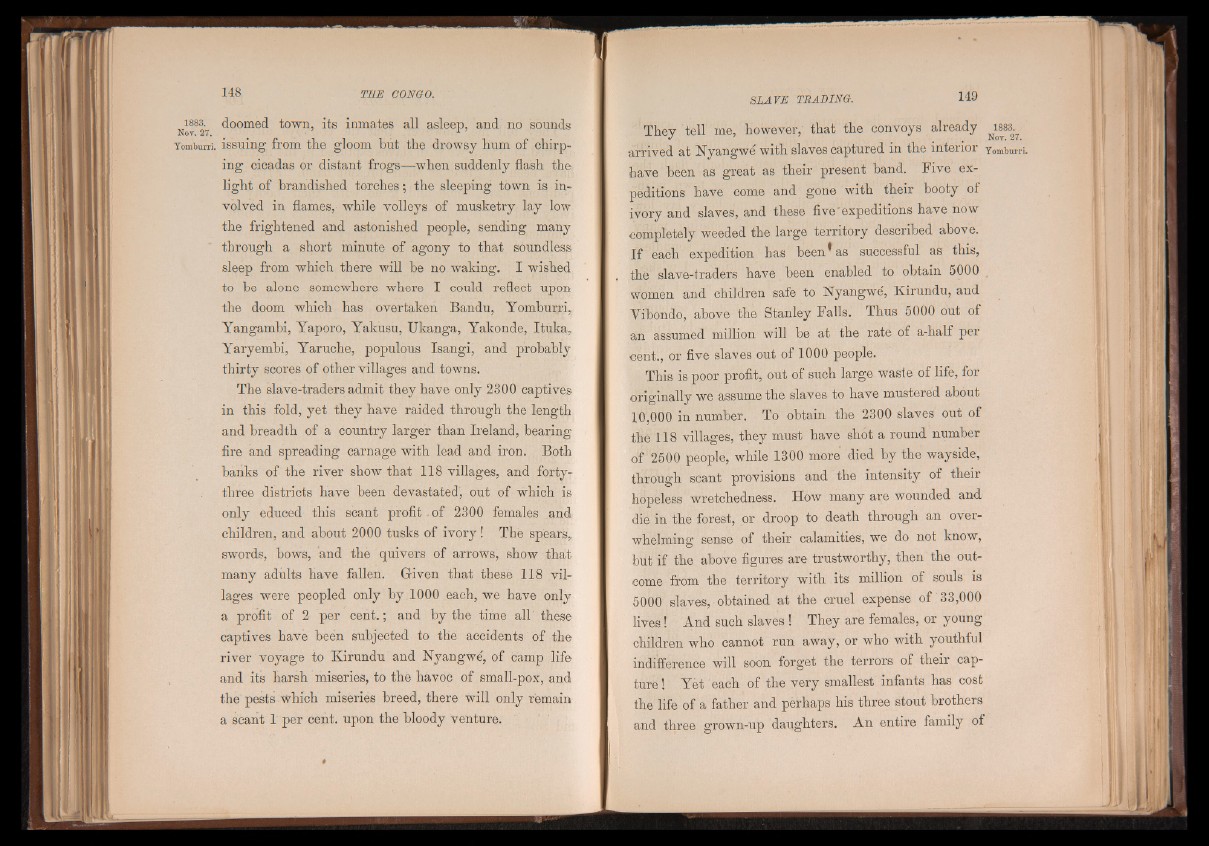
doomed town, its inmates all asleep, and no sounds
ri. issuing from the gloom hut the drowsy hum of chirping
cicadas or distant frogs—when suddenly flash the
light of brandished torches ; the sleeping town is involved
in flames, while volleys of musketry lay low
the frightened and astonished people, sending many
through a short minute of agony to that soundless
sleep from which there will be no waking. I wished
to be alone somewhere where I could reflect upon
the doom which has overtaken Bandu, Yomburri,
Yangambi, Yaporo, Yakusu, Ukanga, Yakonde, Ituka,
Yaryembi, Yaruche, populous Isangi, and probably
thirty scores of other villages and towns.
The slave-traders admit they have only 2300 captives
in this fold, yet they have raided through the length
and breadth of a country larger than Ireland, hearing
fire and spreading carnage with lead and iron. Both
hanks of the river show that 118 villages, and forty-
three districts have been devastated, out of which is
only educed this scant profit of 2300 females and
children, and about 2000 tusks of ivory ! Thè spears,
swords, bows, and the quivers of arrows, show that
many adults have fallen. Given that thesè 118 villages
were peopled only by 1000 each, we have only
a profit of 2 per cent. ; and by the time all these
captives have been subjected to the accidents of the
river voyage to Kirundu and Nyangwé, of camp life
and its harsh miseries, to the havoc of small-pox, and
the pests which miseries breed, there will only remain
a scant 1 per cent, upon the bloody venture.
They tell me, however, that the convoys already
arrived at Nyangwe with slaves captured in the interior
have been as great as their present band. Five expeditions
have come and gone with their booty of
1883.
Not. 27.
Yomburri.
ivory and slaves, and these five'expeditions have now
completely weeded the large territory described above.
If each expedition has been* as successful as this,
the slave-traders have been enabled to obtain 5000
women and children safe to Nyangwe, Kirundu, and
Yibondo, above the Stanley Falls. Thus 5000 out of
an assumed million will be at the rate of a-half per
cent., or five slaves out of 1000 people.
This is poor profit, out of such large waste of life, for
originally we assume the slaves to have mustered about
10,000 in number. To obtain the 2300 slaves out of
the 118 villages, they must have shot a round number
of 2500 people, while 1300 more died by the wayside,
through scant provisions and the intensity of their
hopeless wretchedness. How many are wounded and
die in the forest, or droop to death through an overwhelming
sense of their calamities, we do not know,
but if the above figures are trustworthy, then the outcome
from the territory with its million of souls is
5000 slaves, obtained at the cruel expense of 33,000
lives! And such slaves ! They are females, or young
children who cannot run away, or who with youthful
indifference will soon forget the terrors of their capture!
Yet each of the very smallest infants has cost
the life of a father and perhaps his three stout brothers
and three grown-up daughters. An entire family of